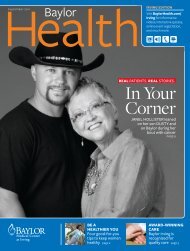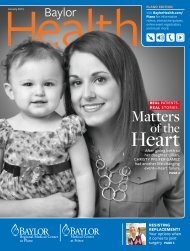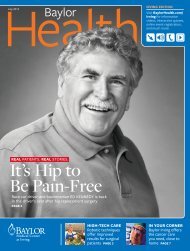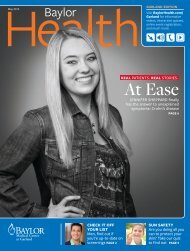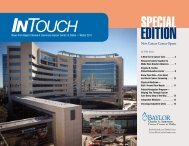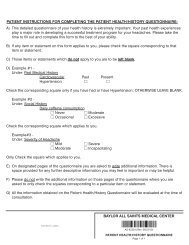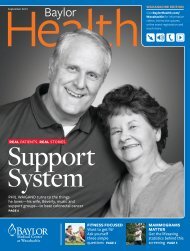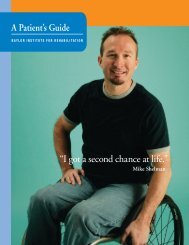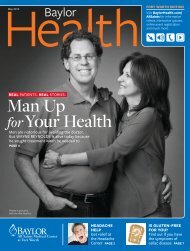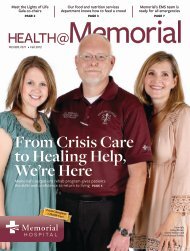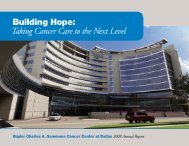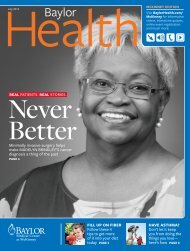Focused on the patient - Baylor Health Care System
Focused on the patient - Baylor Health Care System
Focused on the patient - Baylor Health Care System
Create successful ePaper yourself
Turn your PDF publications into a flip-book with our unique Google optimized e-Paper software.
18<str<strong>on</strong>g>Focused</str<strong>on</strong>g> <strong>on</strong> specialized careLarry CrumlishReceiving a cancer diagnosis is never easy. Larry Crumlishshould know: he went through it twice.This 68-year-old man from Dallas has a loving, supportive,and tight-knit family. Until February 2007, he was feelinggood about having battled and beaten bladder cancer.Larry Crumlish’s granddaughters, Troy, left, and Riley, are <strong>the</strong>apple of his eye. “How can you not get better?”“I have three bro<strong>the</strong>rs who have survived prostate cancer,so I’m aware of how important it is for me to be screenedregularly for <strong>the</strong> disease,” Larry said. It was during a routinefollow-up exam for <strong>the</strong> bladder cancer that his doctor,Joshua Fine, MD, a urologist <strong>on</strong> <strong>the</strong> medical staff at <strong>Baylor</strong>University Medical Center at Dallas, discovered that hisprostate-specific antigen (PSA) level had spiked.Dr. Fine performed a biopsy of Larry’s prostate and c<strong>on</strong>firmed that he had prostate cancer. “Because <strong>the</strong> cancer was soaggressive, I wanted to act fast, but I was determined to be cautious in my decisi<strong>on</strong>-making,” he said.Larry did a lot of research about cancer, physicians, and medical facilities during his first battle with cancer. “The Internet isa great tool,” he said. “I learned so much and I met so many people who became my extended family. I’ve discovered thatprayer, a positive attitude, and loving support all add up to increased odds. That extended family was <strong>the</strong>re for me againafter my prostate cancer diagnosis.”Mr. Crumlish looked to Dr. Fine, <strong>the</strong> surge<strong>on</strong> he had grown to trust and respect during his battle with bladder cancer, toguide him. “Dr. Fine suggested having robotic-assisted surgery to remove my prostate,” he explained.Using <strong>the</strong> robotic system to remove <strong>the</strong> prostate allows <strong>the</strong> <strong>patient</strong> a shorter hospital stay, faster recovery, less blood lossduring <strong>the</strong> operati<strong>on</strong>, and less chance of infecti<strong>on</strong>. “I knew from my research,” said Larry, “that <strong>the</strong> odds of success werevery high with this procedure and <strong>the</strong> risk of nerves being damaged was minimal.”After a short hospital stay, <strong>patient</strong>s are typically back to <strong>the</strong>ir normal routines in 1 to 2 weeks. Once <strong>the</strong>y are home, walkingat least <strong>on</strong>e mile a day is prescribed, something that got easier each day for Larry. Patients are encouraged to get up andmove <strong>the</strong> same day as <strong>the</strong>ir surgery. “A lot of people go through pain with surgery,” he explained. “I’d say for me, it was alittle inc<strong>on</strong>venient and uncomfortable. It was an incredibly easy surgery and recovery.”Larry stressed <strong>the</strong> importance of a support group for dealing with cancer. “It’s always good to have a sense of humor justto help get through <strong>the</strong> tough times,” he chuckled. “In additi<strong>on</strong> to support from my wife, daughter, and family, I receivedencouragement and well wishes from <strong>the</strong> <strong>Baylor</strong> Dallas medical team and so many people I met al<strong>on</strong>g my journey. I’m trulyblessed.”



